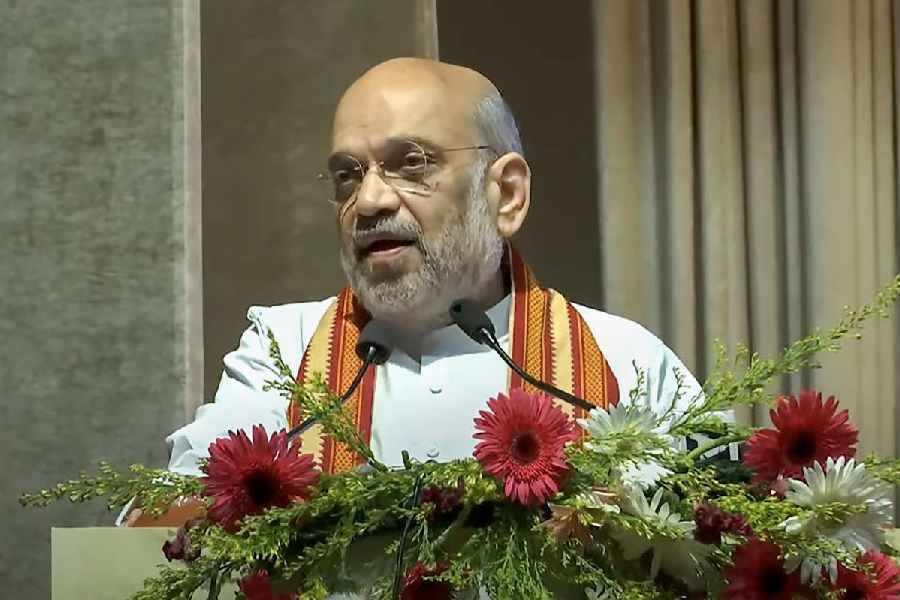Victimhood has reinvented itself — or the BJP has again exposed its disconnect with a large part of the country.
The BJP is crying hoarse over what it believes is a call “for genocide of 80% of the population of Bharat, who follow Sanatan Dharma”.
A person no less than Amit Shah, the Union home minister, has positioned himself on the battlefield to protect “our culture, history and Sanatan Dharma (in Hindi)”.
The cause of the BJP’s alarm is an assertion by DMK leader Udhayanidhi Stalin on Saturday that “Sanatana Dharma is against the idea of social justice and must be eradicated”.
Addressing a writers’ conference in Chennai, the young Stalin, Tamil Nadu minister and son of chief minister M.K. Stalin, went on to refer to diseases such as Covid-19, dengue and malaria while underscoring the need to oppose the rigid and orthodox concepts that have come to be associated with Sanatana Dharma.
The BJP is now seeking to make Sanatana Dharma — not jobs, price rise and education — into an election issue, insisting that Indian “culture” is under siege.
Sanatana Dharma
The textbook definition of Sanatana Dharma (a Sanskrit phrase) is a collection of an absolute set of duties incumbent upon all Hindus, regardless of caste, class or sect. The duties include virtues such as honesty, refraining from injuring living beings, purity, goodwill, mercy, patience, forbearance, self-restraint, generosity, and asceticism.
But in practice, critics have alleged, the principle has been used to justify caste and oppress women.
Udhayanadhi’s remarks appear to have been taken out of context and twisted.
The background
Udhayanidhi was referencing a conflict between casteists and reformists in Tamil Nadu, especially in the last century, in which his grandfather and Dravidian movement leader M. Karunanidhi played a stellar role. The debate has resurfaced now with the BJP trying to gain a toehold in the southern state. Tamil Nadu governor R.N. Ravi, a thorn in the side of the DMK government, is a vocal proponent of Sanatana Dharma.
The theme of Saturday’s conference, organised by the Tamil Nadu Progressive Writers and Artistes Association, was to critique the concept of Sanatana Dharma which implicitly carries connotations of social hierarchy, social distancing and a lack of equality of opportunities.
The critique is rooted in a political context linked to an allegation that the Centre is promoting an overarching and unitary State and encroaching on federalism, manifest in the differences over the one-nation-one-election proposal and the all-India medical entrance exam, NEET.
The Union government’s move to launch the Vishwakarma Scheme has also fed the misgivings. The DMK and other like-minded parties see it as a return to the Kula Kalvi Thittam, an unpopular educational scheme.
The education scheme was introduced when C. Rajagopalachari was chief minister of the erstwhile Madras state. That scheme had been accused of aiming at perpetuating the “Varnashrama Dharma” — people of different castes, after a few hours of school, pursuing their traditional occupation which hinders upward social mobility.
Udhayanidhi’s remarks have to be seen in this comprehensive context. The title of the seminar in Tamil, Sanatana Ozhippu Maanadu, is not about killing anybody but about presenting an alternative worldview associated with the Self-Respect Movement of Periyar (E.V. Ramaswamy Naicker), the father of the Dravidian movement.
“Ozhippu Maanadu” literally translates as “eradication conference” — the reason Udhayanidhi referred to the diseases. He was mounting an ideological and conceptual challenge to Sanatana Dharma, in line with the DMK’s policies and programmes; it was not a statement about abolishing or doing away with any religious practice.
The contrast
Lauding the conference organisers for picking the theme of “Sanatana elimination” rather than choosing “opposition to Sanatana”, Udhayanidhi said: “What is Sanatanam? The very name is from Sanskrit. Sanatana is against equality and social justice and nothing else. What is the meaning of Sanatana? It is eternal, that is, it cannot be changed; no one could pose any question and that is the meaning.”
Opposing the rigidity that came to be associated with Sanatanam (as it is referred to in Tamil), Karunanidhi had established equality neighbourhoods (Samathuvapuram) and settled people belonging to all communities in a single place.
“Our Kalaignar (Karunanidhi) brought a law enabling people belonging to all castes to become archakas (temple priests), our chief minister (Stalin) has appointed people who have completed archaka training as priests at temples; this is the Dravidian model,” Udhayanidhi said.
“What did Sanatana do to women? It pushed women, who lost their husbands, into the fire (the erstwhile practice of Sati); it tonsured the heads of widows and made them wear white saris; child marriages too happened. What did Dravidam (the Dravidian ideology followed by the DMK) do? It gave fare-free travel to women in buses, gave Rs 1,000 monthly assistance to girl students for their college education.”
From September 15, women beneficiaries will be getting a Rs 1,000 monthly assistance (basic income scheme).
Shah’s response
It is against this backdrop that Union home minister Shah on Sunday accused the Opposition INDIA bloc of “insulting our culture, history and Sanatan Dharma” for “vote bank and appeasement politics”.
The choice of the venue where Shah raised the issue suggested the BJP is keen to try and make Sanatana Dharma an election plank.
Shah told a rally in poll-bound Rajasthan: “Over the past two days, two prominent parties of the INDIA alliance, the DMK and the Congress, have been insulting our culture, history and Sanatan Dharma. ...The son of a chief minister has called for the eradication of Sanatan Dharma.”
The home minister asked the crowd if it would allow the end of Sanatana Dharma. “For vote bank and appeasement politics, these people have called for the eradication of Sanatan Dharma. This is an insult to our culture, history and Sanatan Dharma,” Shah said.
Genocide charge
BJP social media head Amit Malviya posted on X (formerly Twitter): “Udhayanidhi Stalin, son of Tamilnadu CM MK Stalin and a minister in the DMK govt, has linked Sanatana Dharma to malaria and dengue. He is of the opinion that it must be eradicated and not merely opposed. In short, he is calling for genocide of 80% of population of Bharat, who follow Sanatan Dharma.... Is this what was agreed in the Mumbai meet?”
Udhay’s rebuttal
Udhayanidhi hit out at Malviya for “spreading fake news”.
“I never called for the genocide of people who are following Sanatana Dharma. Sanatana Dharma is a principle that divides people in the name of caste and religion. Uprooting Sanatana Dharma is upholding humanity and human equality,” he said in a statement.
He further clarified his comparison with malaria and dengue. “Let me reiterate the crucial aspect of my speech. I believe, like the spread of diseases COVID-19, dengue and malaria by mosquitoes, that Sanatana Dharma is responsible for many evils,” he said.
DMK spokesperson Saravanan Annadurai cited the BJP’s “Congress-mukt” comment to counter the BJP’s attack. “If the Prime Minister says ‘Congress-mukt Bharat’, does he call for genocide?” Saravanan asked and termed the BJP’s claim as “fake news” and “hate speech”.
Pet claim
In Rajasthan, Shah widened the sweep of his target to include former Prime Minister Manmohan Singh, unwittingly suggesting that the minority plank, not the original principles of Santana Dharma, was driving his posture.
Shah said that this was not the first time the Congress and its partners had “insulted” Sanatana Dharma. The home minister claimed Singh had said that minorities had the first right over the country’s resources, adding that the former Prime Minister’s statement was part of the Congress’s “appeasement and vote bank politics”.
This is a pet claim of the Right-wing ecosystem, picking out a part of a sentence to make a misleading claim. In 2006, Singh, then Prime Minister, had said: “I believe our collective priorities are clear. Agriculture, irrigation and water resources, health, education, critical investment in rural infrastructure, and the essential public investment needs of general infrastructure, along with programmes for the upliftment of SC/STs, other backward classes, minorities and women and children. The component plans for Scheduled Castes and Scheduled Tribes will need to be revitalised. We will have to devise innovative plans to ensure that minorities, particularly the Muslim minority, are empowered to share equitably in the fruits of development. They must have the first claim on resources.”
The then PMO had pointed out that “the Prime Minister’s reference to ‘first claim on resources’ refers to all the ‘priority’ areas listed above, including programmes for the upliftment of SCs, STs, OBCs, women and children and minorities.”
Additional reporting by PTI










